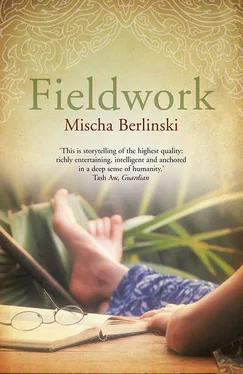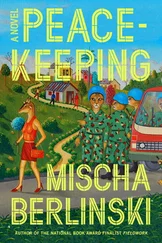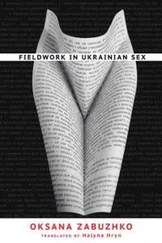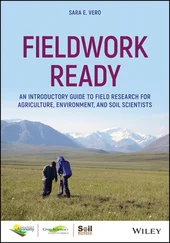There was also a cover letter. Josh fished around in his bag, brought out an envelope, extracted a folded piece of paper, and handed it to me. I unfolded it.
Chiang Mai Central Prison
Chiang Mai
Dear Mr. O'Connor:
I have never properly thanked you for your visit, or apologized for my anger. Please accept my gratitude now, and my apologies.
Paper! Pens! Stamps! What is a would-be scholar's life without them? Your assistance has made it possible for me to complete my research. I have been penniless for such a long time, and I can not tell you the frustration I suffered not being able to complete the attached manuscripts, for lack of these basic necessities. Now I must call on you one more time. I would like to see both of the attached manuscripts published. They must, of course, be properly typed, which is impossible for me in my present circumstances, as you can imagine. The "Notes," etc., are intended for the Southeast Asian Journal of Social Science ; the paper entitled "Economic Organization," etc., I'd like to see sent to Ethnology . It will be necessary to explain the conditions under which the papers have been written as they both lack a scholarly apparatus. If the papers are accepted, please keep whatever modest fees may result as a token of my appreciation.
I thank you, in advance, for your time: I have no one else at all to whom I might entrust these documents. It is a melancholy thought.
Yours most sincerely,
Martiya van der Leun
I read the letter, and then I read it again. Bangkok, the noisy street, the market stench, the passing cars — all these faded away for a moment. I looked at the signature on the letter. It was a messy, almost violent scrawl, the only unclear words on the page. Otherwise her handwriting was a series of fluid, graceful loops.
"That's really something," I said.
"Isn't it?" Josh agreed.
"What were the manuscripts like?"
"That's the thing. They were terrific. I opened up the envelope and I spent the whole evening reading them. When I was in college, there was this girl, she was an anthropology major, you know? and anyhow, I ended up taking a couple of anthropology classes — just Anthro 101, and then a seminar on the Hindus of the Himalayas — but the point is, even I could see right away that this woman — Martiya, not the girl in college— Martiya was a serious anthropologist. I mean, I don't know if she was a professional, but I thought what she wrote was excellent."
"So tell me already, who is this woman?" I asked. I was still waiting for the punch line to the story.
"That's the thing," Josh said. "That's just it. The next morning, I decided to find out more. I was just curious, I'd been curious all year. I called up the prison, and I figured either I would talk to one of the prison administrators or I'd go back up to Chiang Mai and see her again. But when I got the warden on the phone, he hemmed and hawed for a minute and then he told me that Martiya was dead."
"She was dead ?" I still had the letter in my hand, and I looked down at it. The ink was light blue and sharp against the page.
"Yeah, that's the thing. The warden told me that she was dead. She killed herself. She ate a ball of opium and killed herself."
"Wow," I said.
Josh nodded. His face was creased in a gesture of unexpected dignity.
Josh looked at me over his glass of whiskey. He thought that there was a good story here, he said, something for somebody who lived in the North. He didn't have the time to pursue it himself, but he knew that I did. He was offering me the story as a gift. "Maybe you can write it up for the Times ."
"Maybe you're right." I had one more question for Josh. "What did you do with the manuscripts?"
"I did just what she asked. I sent them off a week ago."
Josh had nothing more to tell me about Martiya van der Leun, and I had no more questions. He didn't say it, but I think that he had been troubled by the news of Martiya's death. Martiya's letter remained on the table between us, and from time to time I glanced at it.
A little later, the bill arrived at our table. Josh offered to pay, but looked very relieved when I insisted.
TWO. THE PENDULUM-EDGE OF THE SOUL
WHEN JOSH FIRST TOLD MEabout Martiya van der Leun, Rachel and I had been living in Thailand for almost exactly a year. The two of us came to Thailand not long after the Internet start-up in San Francisco where I had been working went out of business; Rachel had just graduated from college. We were bored and heading fast toward broke, when Rachel found an article on the Internet about how to find a job teaching in international schools around the world. The chief requirements for such posts apparently were a native command of English and a healthy pulse. "I've got that," Rachel said, and like a migrating swallow, her résumé flew to the farthest corners of the globe: to an oddly luxurious all-boys boarding school in Uganda, which asked that all the teachers make a personal commitment to Christ ("I'm willing," Rachel said. "Did you see the pool?"); to a delightful all-girls school in Switzerland; to Tajikistan, where, the school's Web site said, the security situation had stabilized dramatically in recent months; and to Thailand. A week later, the headmaster of the Water Lily International School in Chiang Mai called at three in the morning to offer Rachel a position as a first-grade teacher; she accepted immediately and announced that we were moving to Asia. I bought a copy of Thai Made Simple and began to study. Three months later we were in Chiang Mai, Thailand's second city, way up in the wild North.
We arrived in Chiang Mai strongly under the influence of the English travel writer Norman Lewis, whose elegant memoirs we had read before leaving California. Chiang Mai, Lewis wrote, was the "most delectable of Oriental towns," which "remained beneath a thin veneer of development Thailand's most pleasing city."
The roofs of old Chiengmai, curling at the eaves, lay upon the city like autumn leaves, and from these arose the spires of many temples, spreading the faintest of haloes into the misted sky.
When I read this to Rachel, she said, "Wow," and then said, "Go on." I did:
There could have been no more poetic scene than the line-up soon after dawn of the archers with their crossbows, members of a clan enjoying the privilege of shooting at the stationary outlines of fish in the intensely green waters. All these men in their ancient garb presented roughly identical features to the rising sun as they muttered a prayer at the instant of releasing an arrow.
No more poetic scene , my bony pink ass: all that lay upon the city when we arrived was a thick layer of smog; the "intensely green waters" of the river Ping were the color of chocolate milk; and when I asked after the archer caste, I was informed that such a social class did not exist, and even if it did, the polluted waterway which bisected the city nowadays supported no life whatsoever. Old Chiang Mai in the years since Lewis's visit had been encased in concentric rings of concrete, Chinese-style shop-houses whose roofs did not curl at the eaves. In the antique town center, a large number of automotive dealerships showcased a splendid variety of Japanese motorcycles, pickup trucks, and tires.
We were looking for a gabled teak house of the sort that Lewis so admired, but our real estate agent, a nervous little woman recommended by one of Rachel's colleagues at the school, refused to show us such houses. I suppose it was as if a wealthy but naïve Japanese tourist had arrived in New York and tried to rent an apartment in one of the exotic housing projects of the South Bronx. Such accommodations, she insisted, would be entirely unsuitable. A teak house would not have air-conditioning, and we would sweat. There would be big, big bugs and things that crawled and crept. What we needed, our agent insisted, was a modern concrete house, and it was in a modern concrete house in a suburb of modern concrete houses that we were eventually installed. Only the many temples matched the grandeur of Lewis's description, and from certain vantage points when the smog receded under the force of the late-monsoon winds, we conceded grudgingly that if we squinted we could see in the sky fuzzy rings like cigarette smoke which might be called haloes. These rings, we later learned, were produced by the burning of garbage.
Читать дальше












